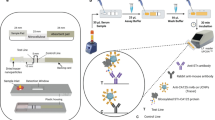Abstract
A monoclonal antibody, H317, has been used for the sensitive and specific detection of placental-type alkaline phosphatase (PLAP) in sera, solubilized tissue extracts and fixed tumour tissue sections from patients representing a variety of ovarian tumours. PLAP was detected in over 30% of these sera and in most solubilized tumour tissue extracts. There was no association between circulating PLAP levels and either tissue extract levels or immunohistological staining of ovarian tumour tissue sections with H317. Nevertheless, immunohistology demonstrated the heterogeneity of cellular localization of PLAP within different tumours, and can often be of value in localizing tumour tissue.
Similar content being viewed by others
Rights and permissions
About this article
Cite this article
McDicken, I., McLaughlin, P., Tromans, P. et al. Detection of placental-type alkaline phosphatase in ovarian cancer. Br J Cancer 52, 59–64 (1985). https://doi.org/10.1038/bjc.1985.149
Issue Date:
DOI: https://doi.org/10.1038/bjc.1985.149
- Springer Nature Limited
This article is cited by
-
Placental alkaline phosphatase in developing normal and abnormal gonads and in germ-cell tumours
Virchows Archiv A Pathological Anatomy and Histopathology (1990)




